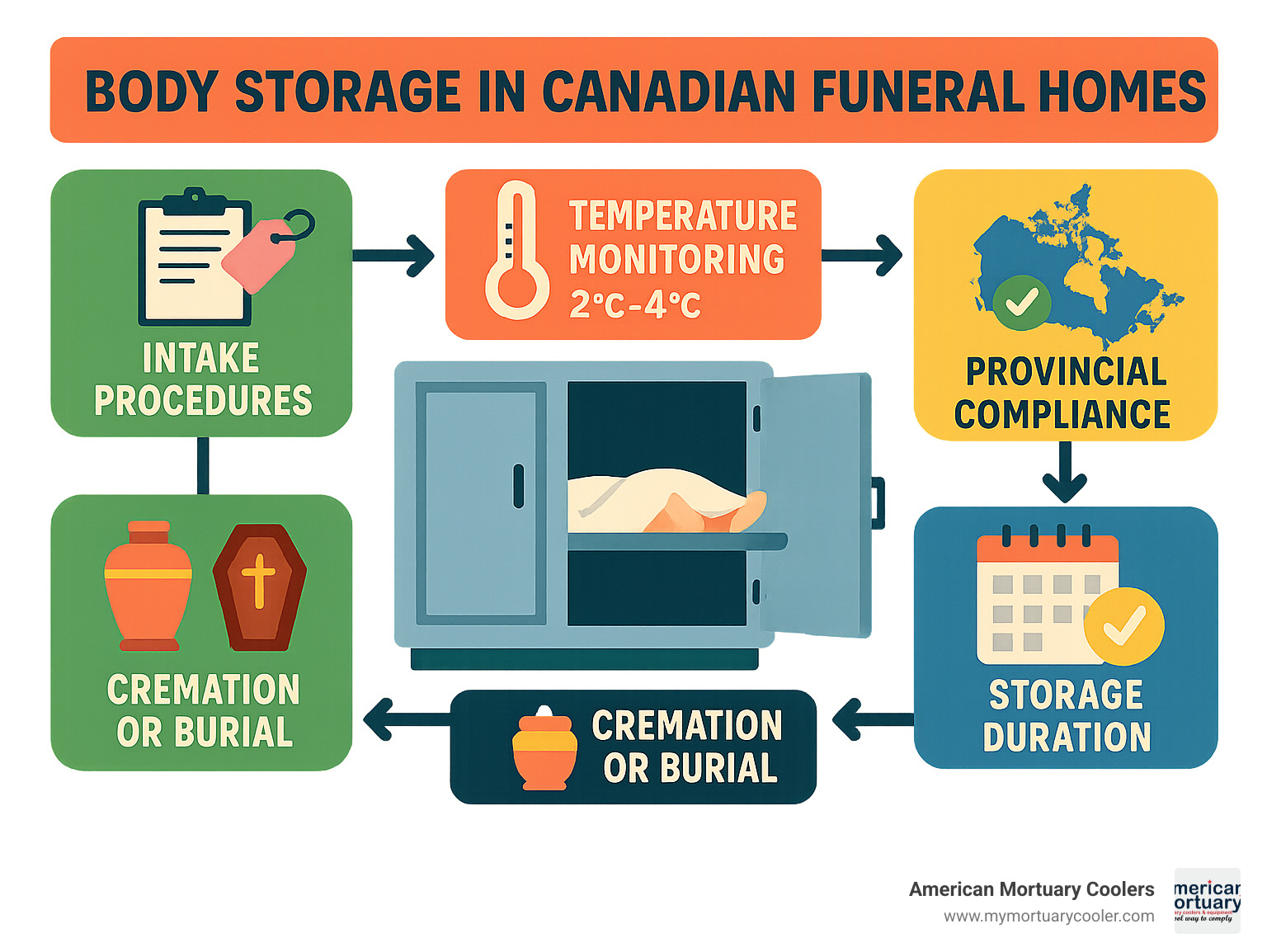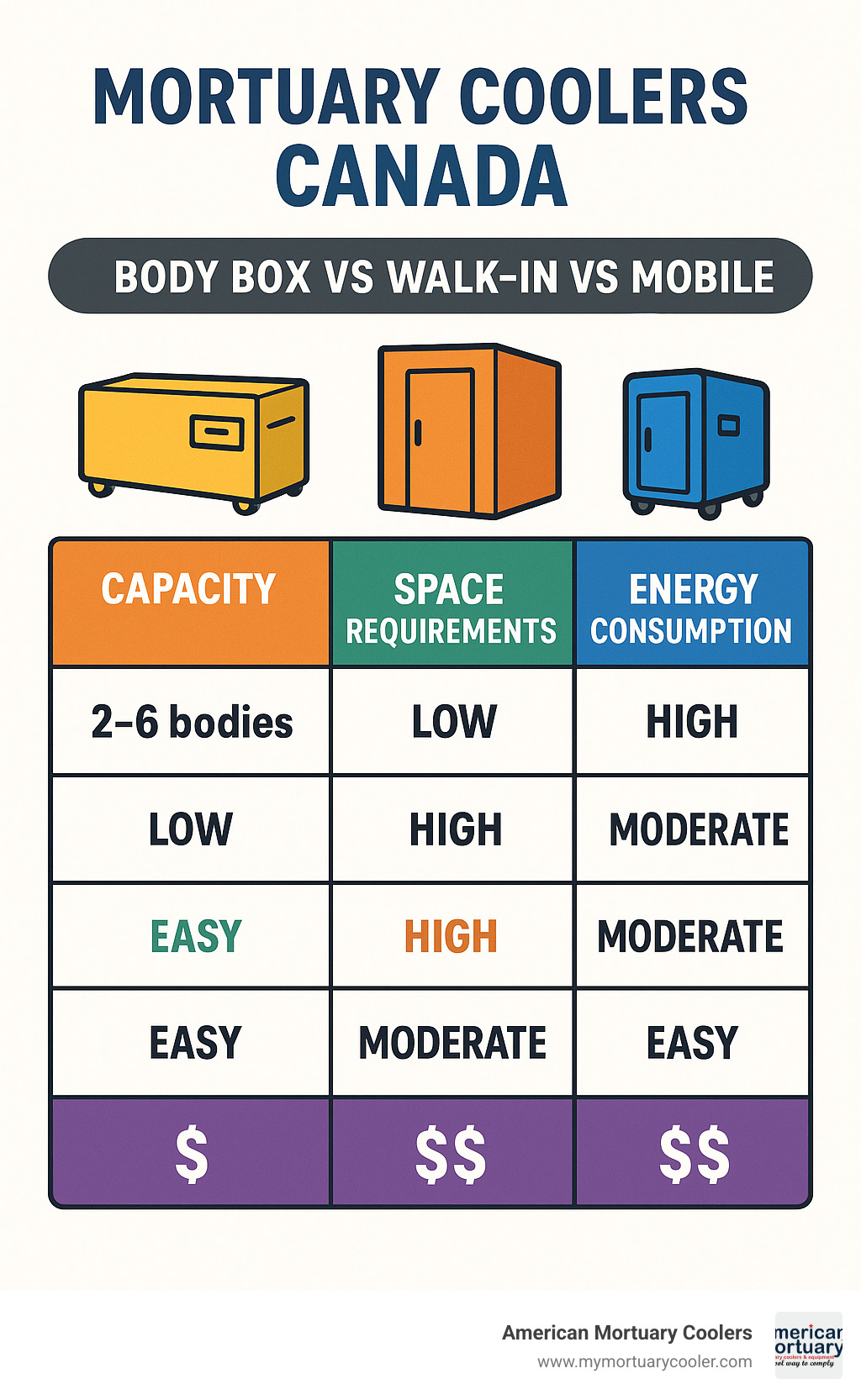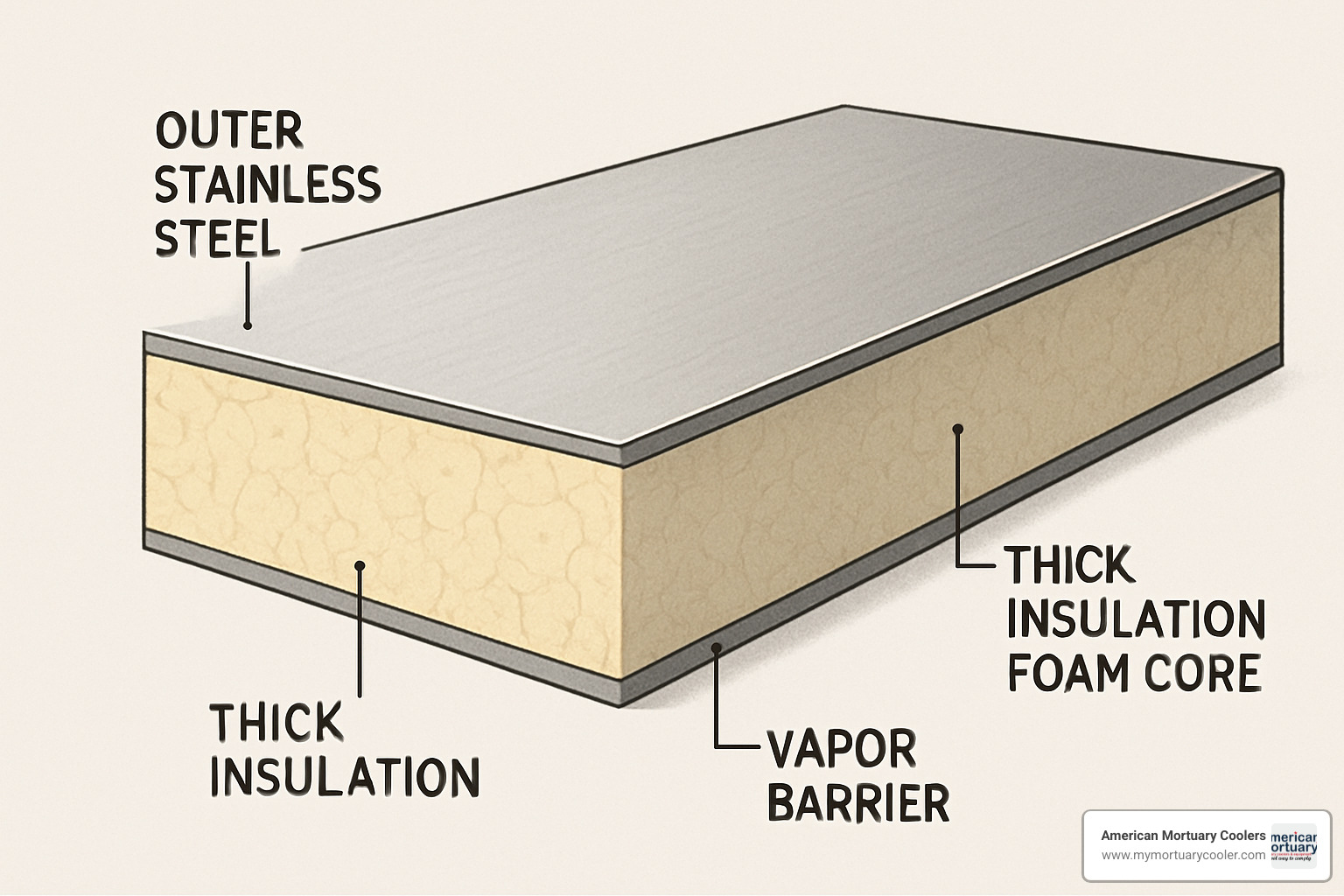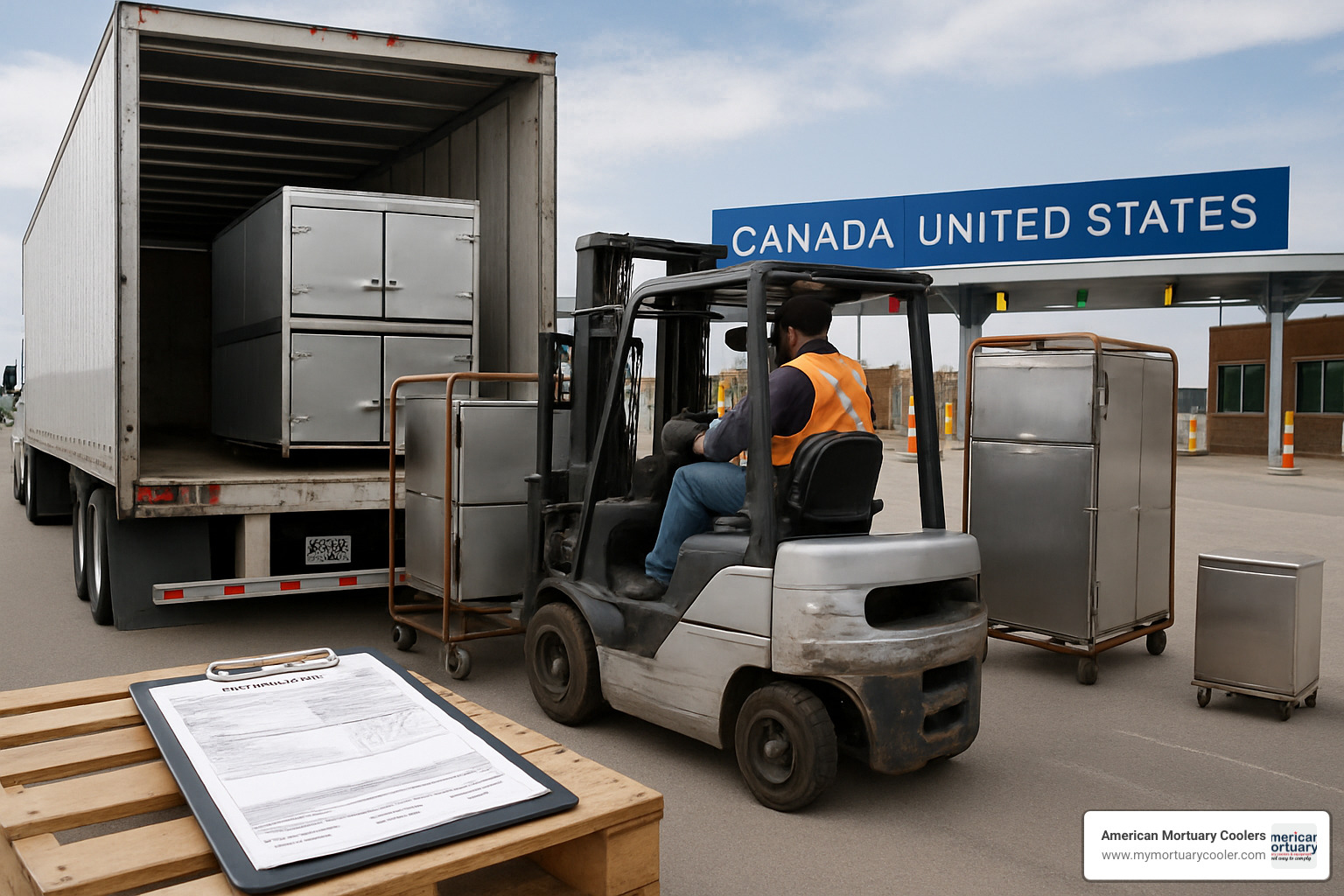Why Mortuary Coolers Are Essential for Canadian Funeral Operations
Mortuary coolers canada facilities rely on are specialized refrigeration units designed to preserve human remains at controlled temperatures between 2°C to 4°C. These systems are crucial for maintaining dignity, complying with health regulations, and managing the increasing demand from Canada's rising cremation rates.
Key Facts About Mortuary Coolers in Canada:
- Temperature Range: 2°C to 4°C (35.6°F to 39.2°F) for optimal preservation
- Legal Status: Required by provincial health authorities for sanitary storage
- Capacity Options: 2-body boxes to 50+ body walk-in units available
- Market Impact: 70%+ cremation rate driving demand for flexible storage solutions
- Energy Standards: Must meet Canadian climate considerations with high R-value insulation
With cremation rates surpassing 70% and projected to reach 80% or higher, Canadian funeral homes face unprecedented pressure on their storage and preparation operations. Provincial regulations across all territories implicitly require proper refrigeration to meet public health standards, making these coolers essential equipment rather than optional upgrades.
The unique challenges of Canada's climate - from extreme cold in northern territories to humid summers in southern regions - demand specialized insulation and energy-efficient designs. Modern mortuary coolers feature digital temperature controllers, alarm systems for compliance monitoring, and 304 stainless steel construction for durability.

Mortuary coolers canada glossary:
How Mortuary Coolers Work & Why They Matter in Canada
Mortuary coolers are specialized refrigeration systems that maintain precise 2°C to 4°C temperatures for proper preservation of human remains. These units use high-efficiency compressors and specialized air circulation to ensure consistent cooling throughout the storage chamber.
Decomposition control is the primary function - proper temperature slows bacterial processes that cause deterioration, giving families time they need without added stress. Canada's geography often requires families to travel long distances for services, making extended viewings essential when relatives are traveling from across the country.
Canadian funeral homes, hospitals, and medical examiners all depend on these systems daily. With cremation rates exceeding 70% and climbing toward 80%, facilities handle more bodies than ever, creating serious capacity pressures that make dependable refrigeration critical.
What Is a Mortuary Cooler?
A mortuary cooler is a specialized cadaver refrigeration system built specifically for storing human remains. The body racks inside accommodate stretchers and body boards, typically measuring between 6'8" and 7'3" in length with proper spacing for easy access.
Modern digital controllers maintain precise temperatures with dual-zone capabilities. Alarm systems monitor high/low temperatures, sensor failures, door openings, and power outages - essential for Canadian regulatory compliance.
Construction features 304 stainless steel throughout for corrosion resistance and easy sanitization, plus thick urethane foam insulation (3-4 inches) for energy efficiency during Canada's harsh winters.
Why Canadian Facilities Cannot Operate Without One
Inspection standards across all Canadian provinces make proper refrigeration practically required. Health authorities expect sanitary storage conditions impossible to meet without proper cooling equipment.
Extended viewings are embedded in Canadian funeral culture, whether families are gathering from across the Prairies or flying in from the Maritimes. The COVID-19 pandemic demonstrated the importance of surge planning - facilities with adequate cooling capacity served their communities with dignity during the crisis.
Regulatory Landscape for Mortuary Coolers Canada
Canadian provinces create implicit refrigeration mandates through requirements for sanitary storage and proper handling of human remains. While most don't explicitly require mortuary coolers, they make compliance impossible without proper cooling equipment.
The 2°C–4°C requirement has become the standard across Canadian jurisdictions - the optimal range where decomposition slows dramatically while avoiding tissue damage. Sanitation protocols require regular cleaning, temperature logs demonstrating consistent compliance, and detailed record-keeping of monitoring activities.
Health authority inspections evaluate whether remains are handled sanitarily and with dignity. Without adequate refrigeration, facilities cannot pass these inspections or maintain operating licenses. CE compliance standards also play a role in equipment certification.
Provincial & Territorial Rules Affecting mortuary coolers canada
Ontario's Funeral, Burial & Cremation Services Act requires funeral establishments to maintain facilities in sanitary condition. While not specifying technical requirements, practical interpretation clearly requires proper cooling systems.
BC's Vital Statistics regulations focus on public health protection when handling human remains. Sanitary storage requirements make refrigeration practically mandatory, even in mild coastal climates.
Quebec's Règlement sur les entreprises funéraires includes specific requirements for facility cleanliness and proper handling procedures, with strong local manufacturing support.
The northern territories face unique challenges requiring reliable, low-maintenance systems that operate independently for extended periods when service technicians are hundreds of miles away.
Holding-Temperature Standards for mortuary coolers canada
The 2°C–4°C range represents decades of practical experience in mortuary science. Temperature stability matters as much as actual temperature - consistent 3°C is more effective than swinging between 1°C and 6°C.
Monitoring tools now include digital thermometers with data logging for demonstrating consistent compliance. Backup power systems are essential during Canada's harsh winter storms, while data logging requirements trend toward more documentation with Wi-Fi connectivity for remote monitoring.
Choosing the Right Mortuary Cooler for Canadian Climate
Selecting mortuary coolers canada facilities need requires considering harsh Canadian weather conditions. Snow load considerations are critical for outdoor units in heavy snowfall regions, while insulation R-value becomes essential for managing energy costs that vary dramatically across provinces.
Energy costs range from Quebec's low hydroelectric rates to Atlantic provinces paying more than double, completely changing total ownership calculations. Redundancy planning ensures backup capacity during equipment failures, while space planning must consider future needs as cremation rates climb higher.
More info about options & features provides detailed guidance on selecting features matching specific needs and budgets.

Main Types Available in Canada
Body boxes remain workhorses for most Canadian funeral homes. These self-contained units house 2-6 bodies in individual compartments and plug into standard 110V outlets - perfect for smaller facilities.
Walk-in coolers provide maximum capacity using modular panels that assemble like building blocks. Need to relocate? Disassemble and rebuild elsewhere. Mobile overflow units became essential during the pandemic, providing surge capacity during high-volume periods.
Energy Efficiency & Insulation Essentials
High-density foam insulation with 3-4 inch panels provides optimal performance for Canadian conditions. This thickness delivers energy efficiency without excessive cost or space requirements.

Compressor sizing requires understanding local climate. Oversized units waste energy through constant cycling, while undersized units struggle during hot summers. Hydro rates vary dramatically - Quebec under 7 cents per kWh versus Atlantic provinces over 15 cents.
Custom & Scalable Solutions
Retrofit options upgrade existing spaces without demolition, perfect for heritage buildings. Bariatric chambers address increasing average body sizes with reinforced construction and larger access doors.
CoolBot retro-cooling systems use standard air conditioners with smart controllers, creating walk-in coolers at fraction of traditional costs. Quick-chill options enable rapid temperature reduction for high-volume facilities.
More info about walk-in specs offers detailed technical specifications for larger installations.
Leading Suppliers & Market Trends in Canada
The Canadian market includes domestic manufacturers and import-ready vendors serving mortuary coolers canada facilities. Local builders offer service advantages, while international suppliers provide broader product ranges and competitive pricing.
Labworks International (Toronto) specializes in custom mortuary cold rooms with 100% redundancy systems. Groupe Protec (Quebec) provides custom morgue refrigeration with advanced digital controllers and energy efficiency focus.
Supply chain considerations became critical following pandemic disruptions. Direct US delivery options provide broader product access, though currency exchange affects pricing. Warranty terms vary significantly between suppliers.
Domestic Manufacturers & Service Networks
Quebec fabrication centers benefit from lower electricity costs and established manufacturing infrastructure. Ontario service hubs provide central access to Canada's largest funeral market with established technician networks. Western Canada installers understand vast distances and varying climate conditions.
Import-Ready Vendors Serving mortuary coolers canada
US custom shippers developed expertise in cross-border funeral equipment logistics. Companies like American Mortuary Coolers offer direct delivery to all Canadian provinces, managing customs clearance and transportation.

Tariff codes for mortuary equipment are generally favorable, but proper classification avoids delays. Lead times for custom equipment typically range 4-8 weeks, though standard models may be available more quickly.
Rising Cremation & Its Impact on Storage Demand
Canada's 70%+ cremation rate creates unique storage challenges. While reducing long-term needs, it increases short-term capacity requirements as bodies move through facilities more quickly. Forecast trends toward 80%+ suggest continued storage pressure requiring flexible sizing.
More info about cremation rise provides detailed analysis of how changing practices affect equipment needs.
Best Practices for Maintenance, Monitoring & Compliance
Maintaining mortuary coolers canada facilities rely on protects families served and ensures regulatory compliance. Daily temperature checks remain essential even with sophisticated alarms - human verification confirms everything looks right.
Digital alarm systems alert to high temperature, power failures, or door issues, but support rather than replace vigilance. Sanitation schedules need weekly deep cleaning with daily spot cleaning, paying attention to drainage systems and air circulation components.
Gasket inspection prevents energy waste and temperature problems. Service contracts with qualified funeral equipment technicians provide peace of mind, while remote Wi-Fi alerts enable proactive responses.

How Long Can a Body Be Stored Safely?
Under proper 2°C to 4°C refrigeration, remains can be safely stored 2-3 weeks without additional preservation. Temperature consistency is crucial - brief warm spells significantly reduce safe storage time. Embalming extends storage time considerably, while freezer options maintaining sub-zero temperatures extend safe storage to several months for forensic cases.
Essential Accessories & Upgrades
Body lifts protect staff from injury while improving efficiency. Battery-powered models handle up to 1,000 pounds safely, paying for themselves through reduced workers' compensation claims.
Stainless steel trays and storage boards provide hygienic surfaces in 23", 27", and 30" widths. Surge racks maximize existing space during busy periods, while battery backup systems ensure continued operation during power outages.
More info about big coolers offers guidance on accessories for larger installations.
Frequently Asked Questions about Mortuary Coolers in Canada
Are mortuary coolers explicitly required by Canadian law?
Canadian regulations focus on sanitary storage and proper handling of human remains rather than explicitly mandating mortuary coolers. However, try operating without proper refrigeration and health authority inspections will fail quickly.
Mortuary coolers canada facilities use aren't technically mandated by name, but they're practically essential for meeting sanitary storage requirements. Public health standards, licensing requirements, and inspection protocols all point to the same conclusion: proper refrigeration is necessary for legal compliance.
What is the typical cost to purchase and install a unit?
Basic 2-body units start around $6,000-$10,000 - workhorse models that plug into standard outlets, perfect for smaller facilities. Larger walk-in systems range from $15,000-$50,000 or more for custom installations, with price increases reflecting significantly more capacity and features.
Installation costs vary dramatically. Simple plug-in units need minimal installation, while walk-in coolers may require substantial electrical work and site preparation. Financing options are widely available with 0% down payment plans and deferred payment options.
How do I make sure my cooler stays within 2°C–4°C at all times?
Temperature consistency combines proper equipment sizing, regular maintenance, and reliable monitoring systems. Digital temperature controllers with data logging provide continuous monitoring and compliance documentation.
Daily temperature checks remain important as safety nets, while regular maintenance of door seals and gaskets prevents energy waste and temperature problems. Backup power systems protect during outages, and modern systems often include Wi-Fi connectivity for remote monitoring and automatic alerts.
Conclusion
Choosing the right mortuary coolers canada facilities need doesn't have to feel overwhelming. Yes, there are regulatory requirements to meet, climate challenges to consider, and evolving market trends to steer. But with the right partner, you can find solutions that work for your specific situation.
Here's what really matters: Canada's cremation rates are climbing past 70% and heading toward 80%. This means your facility needs flexible, reliable cooling systems that can handle changing volumes while maintaining those critical 2°C–4°C temperatures. Whether you're dealing with harsh winters in northern territories or humid summers in southern regions, your cooler needs to perform consistently.
At American Mortuary Coolers, we've spent years helping Canadian facilities solve these exact challenges. From our Tennessee headquarters, we've delivered custom solutions to funeral homes across all provinces and territories. We understand the unique logistics of cross-border delivery, the importance of meeting provincial health standards, and the reality of managing costs in Canadian dollars.
What sets us apart is simple: we build durable, custom solutions that actually work in Canadian conditions. We're not just selling you a cooler – we're providing equipment designed to handle your specific climate, space, and capacity needs. Whether you're a small community chapel or a large metropolitan facility, we take the time to understand what you actually need.
The funeral industry keeps evolving, and reliable cooling systems aren't optional anymore – they're essential. Families deserve dignity and respect during difficult times, and that means having equipment you can count on. Health inspectors expect compliance, and your staff needs systems that make their jobs easier, not harder.
Every successful installation starts with understanding your unique situation. What's your current capacity? How do you handle surge periods? What are your energy costs? Do you need redundancy planning? These aren't just technical questions – they're about helping you serve families better.
More info about choosing a cooler walks you through the decision-making process step by step. But honestly, the best way to get answers is to talk with someone who understands both the equipment and the Canadian market.
We're here to make this process straightforward. From initial planning through delivery and installation, we handle the details so you can focus on what matters most – serving families with professionalism and care. That's what good equipment should do: work reliably in the background so you can do your important work with confidence.


















